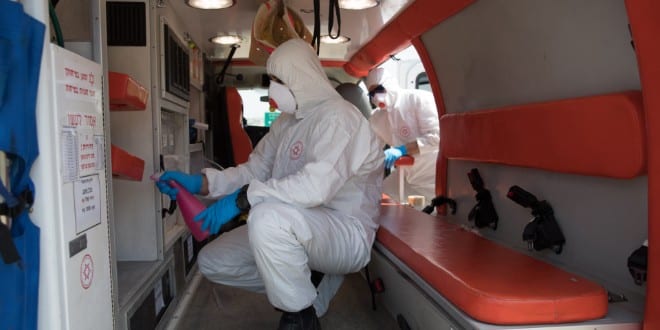Vaccines are the best way to stop the spread of COVID-19, but to encourage people to get their shots and to protect themselves with masks, hygiene and social distancing, health ministries and other government institutions have to make their websites accessible to all.
A survey of nearly 200 countries – including Israel – by researchers and medical professionals from the Azrieli Faculty of Medicine at Bar-Ilan University in Ramat Gan near Tel Aviv, the Galilee Medical Center and Tel Aviv University reveals that most national health authority websites contain errors that may can navigation difficult for disabled. Out of the 200 countries, Israel was rated as a disappointing #50. No comment was available from Einav Greenbaum-Shomron, the deputy director-general for information of the Health Ministry in Jerusalem who is in charge of its website.
The survey has just been published on in the journal Frontiers in Medicine under the title “United by Hope, Divided by Access: Country Mapping of COVID-19 Information Accessibility and Its Consequences on Pandemic Eradication.” The researchers used universal accessibility criteria written by the Web Accessibility Initiative (WAI) to determine what percentage of national health authority websites fully implemented accessibility principles of the WAI, a global organization seeking to improve website accessibility. With the rise in smartphone use as a primary method of gaining Internet access, the researchers also tested the “mobile-friendliness” of the government websites.
The voluntary organization Doctors Without Border advocates for inclusive COVID-19 outreach and educational campaigns with the necessary accommodations specifically for people with vision, hearing, cognitive, and motor impairments. Surprisingly, only a few of the countries examined fully adhered to the WAI guidelines. These included Italy, the Netherlands, Norway, Japan, Poland, South Korea, the United Kingdom and the US. In contrast, websites from the majority of the 189 countries surveyed continue to contain accessibility errors that present significant barriers to people with disabilities. Many countries also had smartphone websites that were not accessible for people with disabilities.
The results show that 89% of countries have websites that fail to conform to internationally recognized accessibility guidelines. While the website of Israel’s Health Ministry is only in 50th place in the world in terms of accessibility, it has been adapted for mobile phone surfing.
The data revealed by the Israeli scientists show that most national health authority websites contain errors that may make site navigation difficult for people with disabilities. As a result, not everyone has equal access to government health websites and, therefore, information to stop the spread of COVID-19. According to the World Health Organization (WHO), an estimated 2.2 billion people suffer from vision impairment or blindness, while 466 million people have a disabling hearing loss. People with temporary or permanent motor or cognitive impairments also require accessibility modifications for proper interaction with websites.
Inconsistent heading levels and font size or color-contrast of elements in webpages are barriers to proper interaction by visually impaired people. Alternative textual descriptions of visual elements on a page are essential for contextual understanding, in addition to proper interaction with text-to-speech engines. Lack of video content subtitles or transcripts present barriers to the hearing impaired. Compatibility with keyboard navigation, including skip linking in the backend of a website, is crucial to accommodate web navigation for people with motor impairment who interact with a single finger or with other motor gestures, the researchers wrote.
“If we want to defeat this pandemic, we can’t ignore billions of people with disabilities,” asserted Bar-Ilan University’s Dr. Amiel Dror who also works at the otolaryngology (ear-nose-and-throat) department at the Galilee Medical Center and was the corresponding author of the survey. “As a clinician-scientist, I see the disparities and barriers that our patients are faced with daily; this has increased dramatically during the COVID-19 pandemic. We cannot expect adherence to the rules of mask wearing, hygiene and social distancing in the fight against the pandemic if information is not accessible to everyone. This pandemic has highlighted the need for accessible, timely information to every person in the world, regardless of mental or functional disabilities. In the absence of narrated accessible information to people with disabilities, we are unable to call ourselves a truly inclusive society.”
Prof. Karen Avraham, who was also involved in the research, added that “this work highlights the importance of intense dialogue between clinicians and researchers to improve the quality of life and access to critical information during emergency situations, such as the one we are facing with this life-threatening pandemic.”
“I hope that in parallel to the intensive laboratory studies undertaken, we can promote the legacy of raising awareness for inclusiveness principles to be implemented in the community, country, and globally,” said Dr. Eyal Sela, head of the department of otolaryngology head and neck surgery at the Galilee Medical Center and an Azrieli Faculty of Medicine staff member who was involved in the research.
The researchers urge that the growth and expansion of the Internet must be accompanied by an equal development of sophisticated accessibility technologies, which would expand the usability of the web to individuals with disabilities. The current COVID-19 pandemic highlights just how important unhindered access to government websites is during a global health crisis. “Pandemic preparedness initiatives in every healthcare system must include awareness provisions for people with disabilities,” said Dror. “It must be included in the DNA of humanity.”
The shortcode is missing a valid Donation Form ID attribute.



